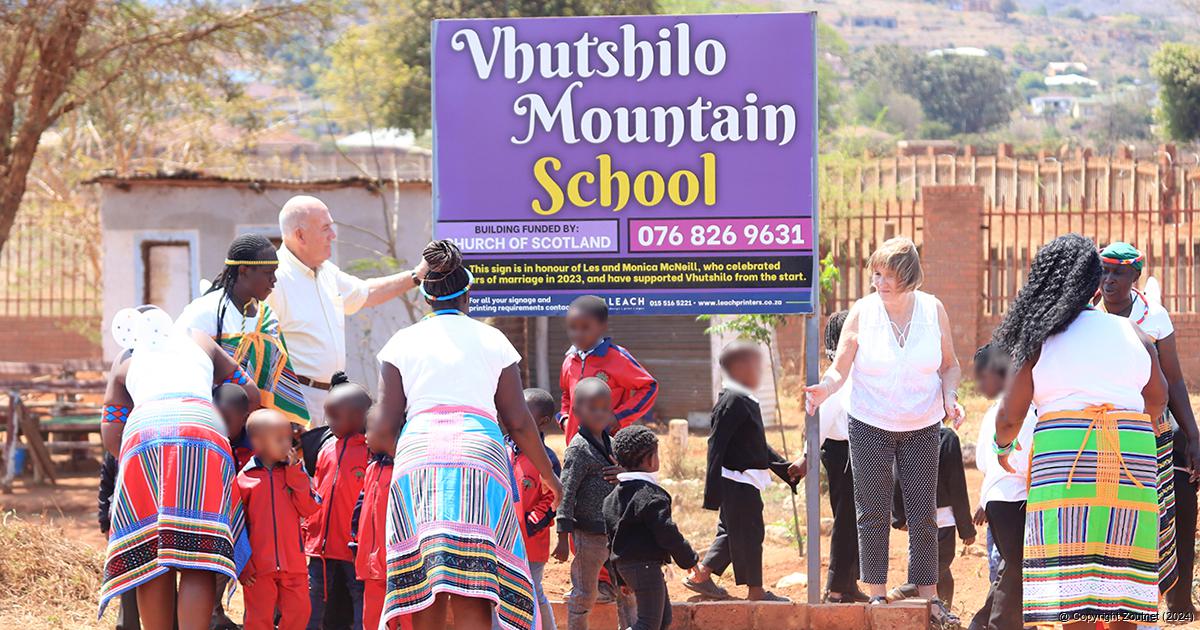The Vhutshilo Mountain School in Nzhelele welcomed two very special visitors from Scotland last week. The small school, which caters to HIV/AIDS orphans, is located in the picturesque Tshikombani village, about 30 kilometres west of Thohoyandou.
The two guests, Mrs Monica McNeill and her husband, Les, have supported the school since its establishment in 2002. Although they had visited before, this time was particularly special as it coincided with the couple's 50th wedding anniversary. To mark the occasion, a special function was held on Tuesday, 1 October, where a signboard was unveiled, acknowledging the Church of Scotland and specifically the McNeill family for their contributions.
The Vhutshilo Mountain School was founded by the late Ms Sue Anne Cook (Suzi), a factory worker from Shayandima. She noticed the plight of women, particularly grandmothers, who could not go to work because they had to care for children whose parents had passed away under tragic and often stigmatised circumstances from HIV/AIDS. This was before antiretroviral (ARV) treatment was widely available. Suzi was especially concerned about the young children who needed daytime care.
Around the year 2000, she began transforming the caravan she lived in at Thathe Vondo into a pre-school. She resigned from her job and dedicated herself to caring for these children. As challenges arose, Suzi not only educated and cared for the children but also supported their families by arranging transport, meals, clothing, and medical care. She initiated a gardening programme to provide fresh vegetables, distributed food parcels to families, and established the village's first paediatric ARV programme.
Her work caught the attention of Prof Fraser McNeill, an associate professor and head of the anthropology section at the University of Pretoria. McNeill was conducting research on HIV/AIDS-related issues. “Grandmothers were under stress as they had to work while taking care of sick children. It was difficult for them to administer the children's medication regularly, and some were forgetting,” McNeill told Limpopo Mirror.
Deeply moved by the school’s impact, McNeill shared its story with his church congregation in Scotland, asking them to raise funds and assist the school. As a result, in 2005, the Inverclyde congregation of the Church of Scotland built a two-classroom school at Tshikombani.
Over the years, countless success stories have emerged from the school, with many former students pursuing higher education and successful careers. Many return to mentor current pupils, sharing their experiences and inspiring the next generation to aim for their dreams.
The school currently accommodates 130 pupils, ranging from toddlers aged 1 to 3 years to Grade 2 pupils (aged 7 to 8 years). Since its official opening in 2005, the school has also started admitting other learners who pay school fees, helping to break the stigma surrounding HIV/AIDS. Most of the children come from nearby villages such as Dopeni and Fondwe.
The school offers a range of programmes tailored to meet the needs of its pupils, including psychosocial support services, counselling, and peer support groups to help children cope with the loss of their parents and the stigma associated with HIV/AIDS.
Much of the school’s success can be attributed to the support from people like the McNeill couple. “Suzi started with nothing. The Church of Scotland built on her inspiration,” said Prof McNeill.
Sue Anne Cook, the school's founder, passed away in 2018 after a long battle with cancer. However, the work she started continues through the dedication of the school’s staff.
Ms Khathu Nemafhohoni, the school’s director, explained that the school’s role extends beyond education as they also visit the children at their homes. “You can imagine a grandmother giving a pill to a child, and it makes the child sick at first,” she said, explaining that grandmothers need to be taught that sometimes the pills need to be cut in half because the dose is too strong for a child.
Nemafhohoni added that funding challenges limit their ability to accommodate more children. She mentioned that they often see children arriving at school unclean and sick, possibly without having been taken to the hospital.
“When we engage with the families, they tell us not to interfere with how they raise their children. We understand, as they carry the heavy burden of caring for their families,” she said. Nemafhohoni encourages orphans who are HIV-positive not to lose hope and to educate themselves about HIV and ARVs.








